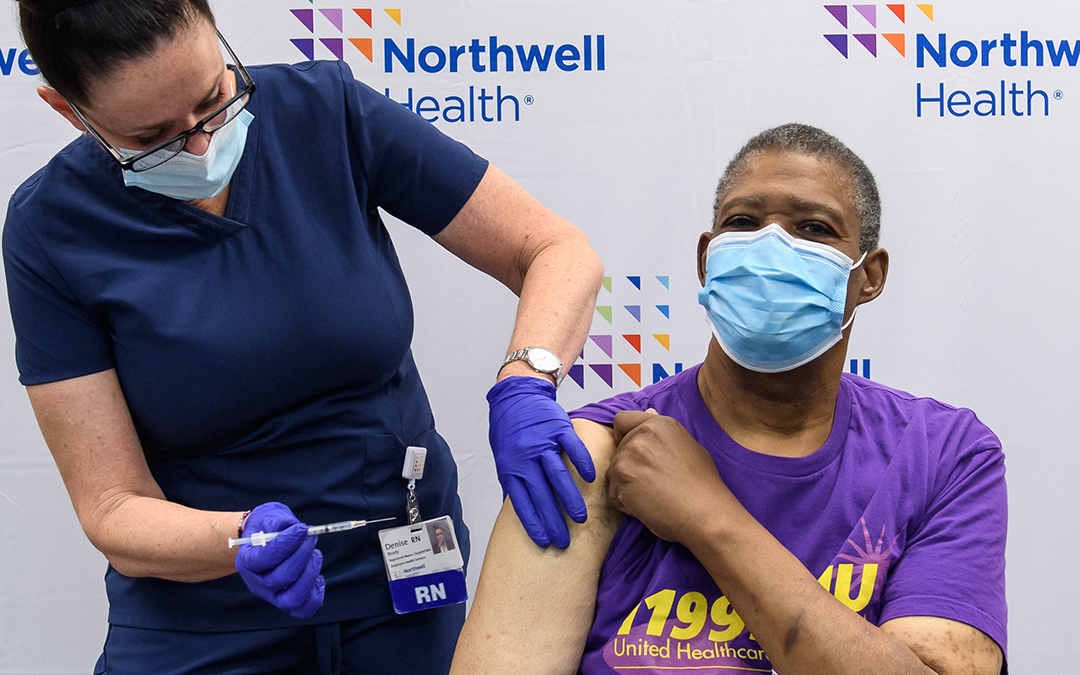
I got boosted
The Benefit Funds’ Chief Medical officer, Van H. Dunn, MD, received his COVID-19 vaccine booster on September 18, 2021. Read More
Vaccine Booster Update
The information contained in this FAQ is for educational and informational purposes only and is not intended as health or medical advice. Because the 1199SEIU Funds cannot provide medical advice, you should speak with your doctor if you have specific questions about your health regarding the vaccines.
I’ve had two COVID-19 boosters — why do I need another one?
Even after getting two COVID-19 boosters, your immunity begins to weaken, so getting the new booster can provide added protection against the virus, especially as precautions have been relaxed and we are entering cold and flu season. The new boosters also protect against the Omicron BA.5 subvariant that is now dominant, as well as the original strain. You must wait at least two months since your last COVID-19 vaccine before receiving a new booster, according to Centers for Disease Control and Prevention guidance. The Pfizer-BioNTech booster is authorized for people age 12 and older, and Moderna’s booster is approved for those age 18 and older.
What are the benefits of a booster? Is it necessary?
When immunity from a vaccine begins to wane, a booster dose may be needed to help “boost” immunity again. A booster also helps strengthen protection against severe disease in those populations who are at high risk for COVID-19 exposure or the complications from severe disease.
Are there any side effects to getting a booster?
Reactions reported after getting a booster dose are similar to those of the initial doses, such as muscle soreness or aching in the arm where the vaccine was administered. It might also include low-grade fever, chills, fatigue, headache and muscle and joint achiness elsewhere. Serious reactions, such as anaphylaxis, hives or itchiness—which are extremely rare—may indicate an allergy to the vaccine.
What if I’m uncertain about getting the booster?
The COVID-19 boosters are safe and effective. We are starting to see reduced protection against mild and moderate COVID-19 disease among people who have been fully vaccinated. With variants such as the highly contagious Omicron and the severe Delta strains still spreading, it is critical to get a booster shot as soon as you can. Boosters are 90 percent effective at preventing hospitalization for those infected with the Omicron variant.
I had a reaction to the COVID-19 vaccine when I received it originally. Will I have the same reaction to the booster?
Many people may experience one or more common reactions to a COVID-19 vaccine, such as muscle soreness or aching in the arm where a vaccine was administered. It might also include low-grade fever, chills, fatigue, headache and muscle and joint achiness elsewhere. Serious reactions to a vaccine, such as anaphylaxis, hives or itchiness, which are extremely rare, may indicate an allergy to the vaccine. You should consult with your primary healthcare provider.
What is the difference between “fully vaccinated” and “up to date with vaccination”? Does it include getting a booster dose?
The definition of “fully vaccinated” does not include the booster shot. Everyone is still considered fully vaccinated two weeks after their second dose in a two-shot series, such as the Pfizer-BioNTech or Moderna vaccines, or two weeks after a single-dose vaccine, such as the Johnson & Johnson (J&J) vaccine. Once an individual is eligible for a booster—five months after the second dose in a two-shot series or two months after the single-dose vaccine—a booster shot is recommended and a person is no longer “up to date” on their recommended COVID-19 vaccination. A person would need to get a booster shot to be considered “up to date.”
If I get a vaccine booster dose, will it be effective against the COVID-19 Delta or Omicron variants?
Current vaccines are expected to protect against severe illness, hospitalization and death due to infection with the Omicron variant. However, breakthrough infections in people who are fully vaccinated are likely to occur. With other variants, like Delta, vaccines have remained effective at preventing severe illness, hospitalization and death. The recent emergence of Omicron further emphasizes the importance of vaccination and boosters.
Is a “booster” and a “third dose” the same vaccine?
The vaccine dose itself is the same. The terms “booster” and “third dose” differentiate why an additional dose of the vaccine is being administered. The reason for needing an additional dose is different for the general population versus those who are immunocompromised. A third dose is recommended at least 28 days after the second dose for those who are immunocompromised, given their weakened immune system, whereas a booster dose can be given five months following full vaccination (Pfizer-BioNTech) for anyone 12 and older; five months following full vaccination (Moderna) for anyone 18 and older; or two months following the Johnson & Johnson (J&J) vaccine for anyone 18 or older, including individuals who received a third dose. A “booster” is for individuals whose response to their second vaccine was likely to be excellent but is weakening, resulting in waning immunity. This is a natural biological response. When immunity from a vaccine begins to wane, a booster dose may be needed to help “boost” immunity again.
If I received two doses of the Pfizer-BioNTech COVID-19 vaccine, am I eligible for an additional booster dose of the same COVID-19 vaccine?
The U.S. FDA and the New York State Department of Health (NYSDOH) have authorized an additional Pfizer-BioNTech COVID-19 booster dose vaccine for individuals 12 or older at least five months after their second dose. If you have questions about your eligibility, consult with your primary healthcare provider or the vaccine administrator.
If I received two doses of the Moderna COVID-19 vaccine, am I eligible for an additional booster dose of the same COVID-19 vaccine?
The U.S. FDA and the New York State Department of Health (NYSDOH) have authorized an additional Moderna COVID-19 booster dose vaccine for individuals 18 or older at least five months after their second dose. If you have questions about your eligibility, consult with your primary healthcare provider or the vaccine administrator.
If I had the one-dose Johnson & Johnson (J&J) COVID-19 vaccine, am I eligible for an additional booster dose of the same COVID-19 vaccine?
The FDA and the NYSDOH have authorized a J&J COVID-19 booster dose vaccine for any individual 18 years or older at least two months after their initial vaccination. If you have questions about your eligibility, consult with your primary healthcare provider or the vaccine administrator.
Do I need to get the same vaccine for my booster as I did for my original immunization (that is, can I mix-and-match COVID-19 vaccines)?
Eligible individuals may choose whether they receive the same or a different vaccine as their booster dose. While booster selection is a personal choice, if you received the Johnson & Johnson (J&J) for your primary vaccination, you may consider switching to an mRNA COVID-19 vaccine (Moderna or Pfizer-BioNTech) for your booster for additional protection against COVID-19. When considering “mix and match,” you should seek guidance from your primary healthcare provider.
Why is the Moderna booster a half-dose?
Moderna chose a half-dose booster because studies indicate this lower dosage triggered fewer side effects, such as fever and achiness, but still boosted an immune response. It also leaves more vaccine available for the global supply.
If I had COVID-19 antibodies or recovered from COVID-19, can/should I get a booster?
Yes. If you are still un-boosted and have recently had COVID-19, you are eligible for the booster starting 10 days after the start of symptoms and/or positive COVID-19 test, are feeling better and are out of isolation. If you had COVID-19 and received monoclonal antibody therapy, you are eligible for the booster beginning 90 days after receiving this therapy. If you have questions about your eligibility, consult with your primary healthcare provider or the vaccine administrator.
Can I still receive a flu shot? Can I receive it at the same time as my booster?
Yes, you can get your COVID-19 booster and the flu vaccine at the same time. We have learned that the way the body develops its immune response and experiences any possible side effects after getting vaccinated is generally the same whether a vaccine is given alone or with other vaccines. You may get your flu shot through your primary healthcare provider or at participating pharmacies. To find a COVID-19 vaccination site near you, visit our website, www.1199SEIUBenefits.org/vaccine-locations.
Guidance for Third Dose for Those Who Are Immunocompromised
Can I receive both a third dose because I am immunocompromised and a booster?
Immunosuppressed people who have received three full doses of either Moderna or Pfizer-BioNTech are able to receive a booster (fourth) dose at least five months for Pfizer-BioNTech or Moderna after their last dose of their primary series. The booster (fourth dose) is always a full dose for Pfizer-BioNTech and a half dose for Moderna. Currently, a third dose for immunocompromised people is not available for the Johnson & Johnson (J&J) vaccine, so those individuals can receive a maximum of two doses: primary first dose and a booster. If you have questions about whether a booster is appropriate, consult with your primary healthcare provider.
Who is eligible for a third dose of the Pfizer-BioNTech COVID-19 and Moderna vaccines?
The Pfizer-BioNTech vaccine is authorized and recommended for individuals age 5 and older or Moderna for individuals age 18 and older as a third dose for those who are immunocompromised. Typically, these include individuals who:
- Have undergone solid organ transplantation or a bone marrow (stem cell) transplant
- Are receiving or recently received treatment for cancer
- Have immune deficiency diseases, such as HIV, and use medications that weaken the immune system, such as corticosteroids or others like those commonly used to treat conditions like inflammatory bowel disease and rheumatoid arthritis, among other conditions.
If you fall into one of these categories, please discuss with your primary healthcare provider whether a third dose of the vaccine is right for you.
How soon after the second dose can immunocompromised individuals receive a third dose of Pfizer-BioNTech or Moderna COVID-19 vaccine?
A third dose is recommended at least 28 days after the second dose for those who are immunocompromised. There is strong evidence that the immune response to the vaccine may be limited in people with a weakened immune system. A third dose has been shown to significantly increase the body’s ability to respond to, and prevent infections from, the virus that causes COVID-19. If you have questions about your eligibility, consult with your primary healthcare provider or the vaccine administrator.
For the latest information from the New York State Department of Health on COVID-19 Booster Doses, please visit https://covid19vaccine.health.ny.gov/booster-doses.

